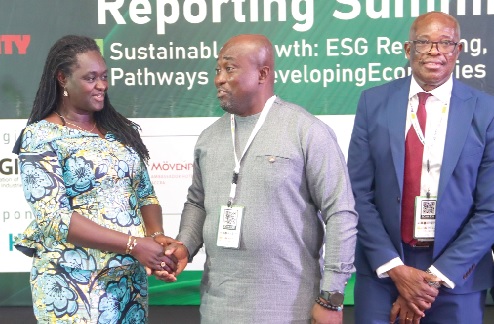Speakers at the maiden Africa Global Environmental, Social, Governance (ESG) and Sustainability Summit in Accra have called for robust data infrastructure to ensure effective reporting.
Speakers at the two-day summit, which commenced in Accra yesterday, said such an investment was the best way forward to effective ESG reporting to unlock the green capital market for sustainable development.
Those who made the call were the Chief Executive Officer of the Environmental Protection Authority (EPA), Prof. Nana Ama Brown Klutse; the Director of Renewable Energy at the Ministry of Energy and Green Transition, Seth Mahu; and the CEO of TSL Sustainability, a private sustainability entity, Dr Shelter Lotsu.
In separate statements, they also stressed the need for enhanced stakeholder collaboration involving researchers, academia, civil society organisations, and development partners for a sustainable ESG ecosystem.
Summit
The two-day summit, organised by TSL Sustainability, in collaboration with the ministries of Energy and Green Transition, Land and Natural Resources, and Environment, Science and Technology (MEST), was on the theme: "Sustainable growth: ESG taxonomy, and strategic pathways for developing economies."
In attendance are stakeholders in the sustainability space, including policymakers, researchers, development partners, and CSOs.
Among issues being discussed are ESG reporting frameworks, how African economies can strategically position themselves in the green transition by addressing critical challenges of climate change, artisanal and small-scale mining, energy transition, sustainable finance, and governance reforms.
Prioritising ESG
In a speech delivered on his behalf, the Minister of Energy and Green Transition, John Abdulai Jinapor, said the growing industrial base of African economies, coupled with the youthful demographics, natural resources and digital transformation, was a unique opportunity for the continent to lead in the global transition to sustainable economies.
"Global markets demand transparency, sustainability, and credible transition, and ESG is no longer optional; it is essential to access concessional finance, unlock new markets, strengthen supply chains and create quality jobs," he added.
The speech, which was delivered by Mr Mahu, said the summit also presented an opportunity for the government to design practical roadmaps tailored to the country’s development realities, such as powering industry, formalising the informal sector, and protecting livelihoods.
He added that the government was focused on promoting energy efficiency, clean fuels, and green hydrogen while protecting natural capital and empowering host communities.
"We are developing an energy transition investment pipeline and a sustainable finance framework to guide investments and combat greenwashing," the minister said.
Environmental stewardship
Prof. Klutse also said that building a robust system for ESG and climate data was key to sustaining the environment and stressed the need for a multi-stakeholder approach to environmental stewardship.
She said the EPA was committed to delivering on its mandate by ensuring that environmental stewardship and compliance were embedded in corporate practices.
Prof. Klutse said that the Ministry of Finance had started piloting green procurement procedures that sought to reward local contractors who met green requirements in their projects.
Mandatory ESG
For his part, Dr Lotsu underscored the need for governments in Africa to make it mandatory for companies to incorporate ESG into their operations.
He said all aligned ministries in the environment and sustainability space must work together in a coordinated manner to implement policies that promote sustainability.
"It is critical for the government and stakeholders to ensure that we embed environmental and social safeguards into our development models.
And related ministries must unite around the sustainability agenda to help unlock the $40 billion.
ESG-aligned capital market," Dr Lotsu added.

